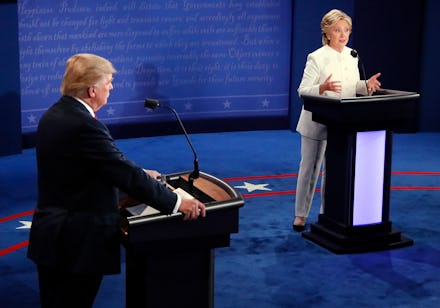4 takeaways from the third presidential debate

The third and final presidential debate is, mercifully, over.
Donald Trump came into the evening in bad shape and needed to do something drastic to change the course for his campaign, which is trailing that of Democratic rival Hillary Clinton in the polls by wide margins.
Mission failed.
The Republican candidate came into the debate more than 6 points behind Clinton, according to the RealClearPolitics average.
And it's hard to see how Wednesday night's match-up could change that.
Here are the four biggest takeaways from the last debate of the 2016 election:
Against all odds, the debate was substantive.
Before the night began, Trump's camp seemed to be gearing up for an ugly brawl on the debate stage.
They brought guests meant to rattle Clinton, including the mother of a man who was killed in Benghazi, President Barack Obama's half-brother who has publicly endorsed Trump and a new woman who came forward in an interview with Breitbart News just hours before the debate to accuse former President Bill Clinton of sexual assault.
Yet instead of shifting the spotlight to those audience members, the debate actually stayed focused on policy.
The candidates talked about the economy, ISIS, Syria, Supreme Court nominations and abortion rights.
It was the most we heard about what the candidates thought on policy in any debate of the entire election — primaries included.
We can thank moderator Chris Wallace for that.
Wallace, who hosts Fox News Sunday, was the best moderator of all three general election debates.
He asked substantive questions. He was unrelenting when the candidates tried to dodge questions. He kept the night on track:
And he fact-checked the candidates when warranted:
Wallace earned plaudits from all sides for his performance:
Ultimately, Hillary Clinton won the night.
Sure, Trump got in some jabs, keeping Clinton on her toes about trade and her charitable foundation. But the only memorable moments of the night were things that made Trump look bad and Clinton look good.
Trump's lowest point came when he refused to say whether he'd accept the results of the general election on Nov. 8.
"There is a tradition in this country ... that no matter how hard fought a campaign is, that at the end of the campaign, that the loser concedes to the winner," Wallace said. "Not saying that you're necessarily going to be the loser or the winner, but that the loser concedes to the winner, and that the country comes together in part for the good of the country. Are you saying you're not prepared now to commit to that principle?"
To that, Trump responded, "What i'm saying is, I'll tell you at the time. I'll keep you in suspense, OK?"
The moment is already dominating the post-debate coverage:
And it's unlikely to play well with the general electorate:
Trump had other bad moments, too.
During an exchange in which Trump sought to defend himself from the 11 women who have come forward publicly to accuse Trump of sexual assault, he deflected.
The women were merely seeking "fame," he said, insisting that "nobody has more respect for women" than he does.
To that remark, the audience laughed — a dismal sign for Trump's chances.
Thank God the debates are over.
There have been dozens of debates this election, both in the primary and general election.
Mic reporter Stefan Becket calculated that, if you watched every minute of every debate, you would have watched 50.25 hours of debates.
That's more than two full days of your life — and those days are now, gloriously, behind us.
Our next big challenge? Surviving the next 20.